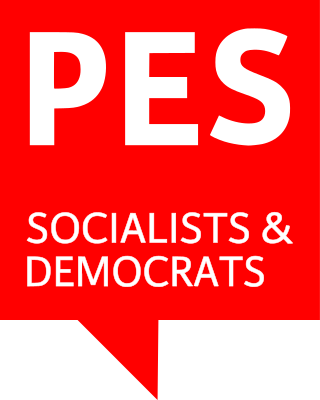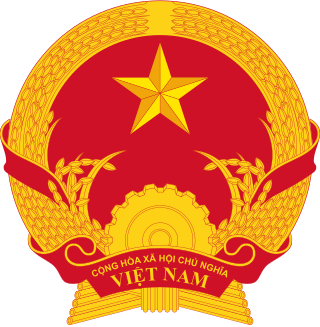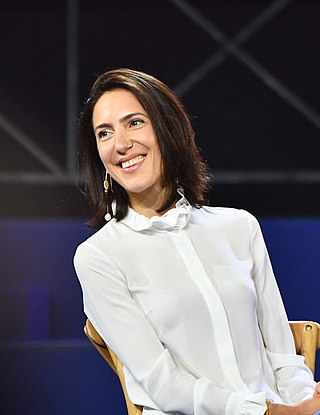
The Party of European Socialists (PES) is a social democratic and progressive European political party.

The president of the European Commission is the head of the European Commission, the executive branch of the European Union (EU). The president of the Commission leads a cabinet of Commissioners, referred to as the College. The president is empowered to allocate portfolios among, reshuffle, or dismiss Commissioners as necessary. The College directs the commission's civil service, sets the policy agenda and determines the legislative proposals it produces. The commission is the only body that can propose or draft bills to become EU laws.

The politics of Vietnam is dominated by a single party under an authoritarian system, the Communist Party of Vietnam (CPV). The President of Vietnam is the head of state, and the Prime Minister of Vietnam is the head of government, both of these are separate from the General Secretary of the Communist Party of Vietnam who leads the CPV and is head of the Politburo and the Central Military Commission, thus the General Secretary is the de facto supreme leader of Vietnam. Executive power is exercised by the government and the President of Vietnam. Legislative power is vested in the National Assembly of Vietnam. The Judiciary is independent of the executive. The parliament adopted the current Constitution of Vietnam, its fifth, on 28 November 2013.
Primary elections, or direct primary are voting processes by which voters can indicate their preference for their party's candidate, or a candidate in general, in an upcoming general election, local election, or by-election. Depending on the country and administrative divisions within the country, voters might consist of the general public in what is called an open primary, or solely the members of a political party in what is called a closed primary. In addition to these, there are other variants on primaries that are used by many countries holding elections throughout the world.

Michel Rocard was a French politician and a member of the Socialist Party (PS). He served as Prime Minister under François Mitterrand from 1988 to 1991 during which he created the Revenu minimum d'insertion (RMI), a social minimum welfare program for indigents, and achieved the Matignon Accords regarding the status of New Caledonia. He was a member of the European Parliament, and was strongly involved in European policies until 2009. In 2007, he joined a Commission under the authority of Nicolas Sarkozy's Minister of Education, Xavier Darcos.

Jean-Claude Juncker is a Luxembourgish politician who was the 23rd prime minister of Luxembourg from 1995 to 2013 and 12th president of the European Commission from 2014 to 2019. He also was Finance Minister from 1989 to 2009 and President of the Eurogroup from 2005 to 2013.

Richard Graham Corbett CBE is a former British politician who served as the final Leader of the European Parliamentary Labour Party (EPLP), from 2017 to 2020. He was a Member of the European Parliament (MEP) for Merseyside West from 1996 to 1999 and then for Yorkshire and the Humber from 1999 to 2009, when he lost his seat, and again from 2014 to 2020. He attended Shadow Cabinet meetings and was a member of the Labour Party's National Executive Committee.

The president of the European Parliament presides over the debates and activities of the European Parliament. They also represent the Parliament within the European Union (EU) and internationally. The president's signature is required for laws initiated under co-decision and the EU budget.

Pierre Moscovici is a French politician who served as the European Commissioner for Economic and Financial Affairs, Taxation and Customs from 2014 to 2019. He previously served as Minister of Finance from 2012 to 2014 and as Minister for European Affairs between 1997 and 2002.

Elections to the European Parliament take place every five years by universal adult suffrage; with more than 400 million people eligible to vote, they are the second largest democratic elections in the world after India's.

The political structure of the European Union (EU) is similar to a confederation, where many policy areas are federalised into common institutions capable of making law; the competences to control foreign policy, defence policy, or the majority of direct taxation policies are mostly reserved for the twenty-seven state governments. These areas are primarily under the control of the EU's member states although a certain amount of structured co-operation and coordination takes place in these areas. For the EU to take substantial actions in these areas, all Member States must give their consent. Union laws that override State laws are more numerous than in historical confederations; however, the EU is legally restricted from making law outside its remit or where it is no more appropriate to do so at a state or local level (subsidiarity) when acting outside its exclusive competences. The principle of subsidiarity does not apply to areas of exclusive competence.

Dame Pauline Green, is a former Labour and Co-operative Member of the European Parliament and former Leader of the Parliamentary Group of the Party of European Socialists (PES). As leader of the PES, she had a central role in the controversy surrounding the failure to discharge the European Commission (EC)'s 1996 budget, bringing the first motion of censure against the commission but voting against it. She then changed her position following corruption allegations raised by EC official Paul van Buitenen to call for Jacques Santer to react promptly or be sacked. Green lost the leadership of the PES in 1999, which was attributed in part to her handling of the incident.

Sergey Dmitrievich Stanishev is a Bulgarian politician who is serving as a Member of the European Parliament (MEP). He previously served as President of the Party of European Socialists from November 2011 to October 2022, Prime Minister of Bulgaria from 2005 to 2009, Leader of the Bulgarian Socialist Party from 2001 to 2014 and Member of the National Assembly from 1997 to 2014.
The Justice Party (Ukrainian: Партія «Справедливість»; formerly known as the Party of All-Ukrainian Union of the Left "Justice" is a left-wing political party in Ukraine. The party merged into the new party United Left and Peasants in December 2011. Justice Party leader Stanislav Nikolaenko became the first party leader of United Left and Peasants. United Left and Peasants changed its name to Justice Party in 2014.

Left Ecology Freedom was a democratic socialist political party in Italy whose bulk was formed by former members of the Communist Refoundation Party.

The 2014 European Parliament election was held in the European Union, from 22 to 25 May 2014.

The Democratic Forum for Labour and Liberties, also referred to as Ettakatol or by its French acronym FDTL, is a social democratic political party in Tunisia. It was founded on 9 April 1994 and officially recognized on 25 October 2002. Its founder and Secretary-General is the radiologist Mustapha Ben Jafar.

The Progressive Alliance of Socialists and Democrats (S&D) is the political group in the European Parliament of the Party of European Socialists (PES). The Progressive Alliance of Socialists and Democrats was officially founded as a Socialist Group on 29 June 1953 which makes it the second oldest political group in the European Parliament after Renew Europe (Renew). It adopted its present-day name on 23 June 2009. Centre-left in orientation, the group mostly comprises social-democratic parties and is affiliated with the Progressive Alliance and Socialist International.

The Spitzenkandidat process is the method of linking the choice of President of the Commission to the outcome of the European Parliament elections, by having each major European Political Party nominating their candidate for Commission President prior to the Parliamentary elections. The Spitzenkandidat of the largest party would then have a mandate to assume the Commission Presidency. This process was first run in 2014, and its legitimacy was contested by some of the members of the European Council.

The 2024 European Parliament election is scheduled to be held on 6 to 9 June 2024. This will be the tenth parliamentary election since the first direct elections in 1979, and the first European Parliament election after Brexit.

















